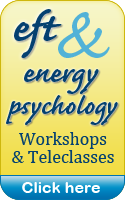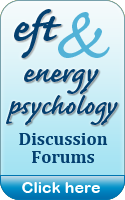How to Control Your EFT Sessions
A guide for your EFT session with your practitioner
By
Suzanne Zacharia
(Add or view comments at the bottom of the page.)
When we attend sessions for EFT, we may worry about getting waylaid into issues that we do not feel are the relevant ones to work on next. Of course, it is important that you are the driving force behind your own sessions and that you feel totally comfortable with that. It is also useful to consider the following factors.
- Often someone on the outside of us sees the whole picture whereas we only see part of it, and so I may think it important to go where you do not think is relevant.
- After working on an issue, there might be the Apex effect. This is when we completely forget we had a problem with that issue, because it has healed so well. The Apex effect happened with a client who on her next session, complained that I wasted the whole of the previous session on something that she had never had a problem with, and could we please concentrate on something relevant this time. So I brought out the previous session´s records for her to see, and she was totally shocked to remember that yes, she did use to have an issue there. She looked totally confused about it until I reassured her that there is something called the Apex effect and explained it to her. She then said she understood and was happy with the previous session.
- When there are a number of aspects and manifestations to heal, then the way to healing is through many doors. Each door opens up into a room where there is stuff to take out and heal. When finished in one room, we feel lighter and then move onto another door. When there are many doors to choose from, there will be many equally important doors. And so opening one of those doors instead of another is inevitable, since we cannot open all the doors at once. There are also times when the practitioner goes through an appropriate and advisable door but this is too overwhelming for the client and just not suitable. It is best on this occasion for the client to immediately tell the practitioner that it is the wrong door, and for the practitioner to respect that.
- Some clients have been indoctrinated by previous therapy or study into believing certain issues are important and others do not count. For example, I had worked on a client´s perceived root issues in childhood to no avail only to find that the real trauma had happened just a few years previously; and when we worked on this, the client finally started feeling better. I have also worked with clients that have been traumatised, bullied, and made to feel bad about themselves by talk therapists and psychologists. Sometimes this happened when the client was a child, because the child had been acting out due to parental abuse, or because the child was possibly autistic or had ADHD but not diagnosed as such. This child would grow up believing all the bad things about themselves but not allowing me as a practitioner to go to those psychologist events, as they were not ready to change that belief as yet; it had become part of their identity.
Having said that, there are times when a really urgent issue pops into a client´s head for healing, and if they wait for the practitioner to finish what we are tapping on first, they may then get distracted and forget that issue, which comes up a bit too late after the session. Should that happen, it is good to interrupt and say that something popped into your head, and explain what it is. Then the practitioner may go there straight away or may lead onto it. Often, I would go there almost straight away and then come back later to where we were before. The reason why I would come back is that sometimes EFT is like opening a dusty old box full of smelly old stuff. Once we open the box, the smell comes out, and so it is good to get rid of the smell in that session for that particular box.
What is called daisy-chaining is a common occurrence in EFT, where the event we are working on leads to another, possible more core one, and this is a beautiful way of unravelling an issue through events and aspects as they come to you.
On some rare occasions, this issue that pops into the client´s head may not be helpful. An extreme example of this is clients who engage in an addictive or compulsive behavior during the session, be it smoking, eating, text-messaging or emailing an ex they were compulsively holding onto, gambling, or even speaking to an ex they were compulsively communicating with - all during the session instead of tapping. This may seem like the client taking control of issues by partaking in an activity they want to engage in, but to do so instead of tapping is the client losing control, and the practitioner´s job is to help the client regain control of their life. In this extreme case, I always recommend that the client visit their doctor for help with medication, in order to be able to sit through a session and work on the relevant issues without the need to continually partake in the destructive behavior instead.
In conclusion, there are a number of factors that influence where in the treatment is the ideal place to go, and it often just is not at all clear-cut. Somewhere in-between a client letting their issues to take complete control and a practitioner taking complete control is a happy medium where the session should be. And we are all human; it is not always possible to get it right 100% of the time. Given enough sessions, and commitment from both the client and practitioner, the most complex issue can be resolved with EFT.
View All Articles by this Author
Author's Bio:
© Suzanne Zacharia 2010. My name is Suzanne Zacharia and I am committed to spreading the word about health options. I believe that the more and better options one has, the more choice there is. And of course, you are advised to consult with your medical practitioner before embarking on any course of alternative, complementary, or beauty therapy. Want to use this article? You can, as long as you credit me with it and invite your readers to get my FREE "EFT How-to for You" and regular free EFT Tapping script samples in my newsletter at http://www.EFT-Scripts.com - New to EFT? No worries, just get your own copy of "EFT How-to for You" and start EFTing with ease very soon!
2 Comments
Christa
Posted December 05, 2010 01:27 AM
Hi Suzanne:
I found your article interesting, particularly the subject of "daisy chaining" which addressed a problem that I had been pondering.
My question, though, is about your statement that you request that a client get medication from his doctor if he has a problem getting through a session without it. Wouldn't the medication interfere with his ability to profit from the session?
Thanks,
Christa
Suzanne Zacharia
Posted December 05, 2010 02:32 AM
Hi Christa,
Thank you. I am glad the daisy-chaining bit was useful to you.
Whilst there are a few medications that do interfere with the client┤s functioning, I have three ways of dealing with this situation. The first is to explain to the psychiatrist that the medication is getting in the way of the sessions and ask that they prescribe a different drug. The second is to muscle-test the client for what we need to work on instead of asking for numbers (SUDS), then treat and re-test until the issue is clear. The body will still talk to me and communicate its distress even if the mind is too drugged. The third is to simply ask the client what their negative thought right now is and simply work with that until the thought changes. When the client has no more negative thoughts for that session, we are done.
I think most of us holistic folk would avoid medication as much as possible. The exception is when the client finds it impossible to attend a session without self-destructing during the session. We are talking about things like clients who cannot repeat the phrases because they are busy eating compulsively and have food in their mouth instead, with their hands busy shovelling food in, so they could not tap; or clients who are stalking an ex actually during most of the session, by email, Skype, mobile phone, or writing them a letter. These are extreme cases but have actually happened in my client sessions. The clients were totally anti-medication but were also so out of control, they could not do EFT but would book a session with me and continue in the destructive behaviour during the session instead of doing EFT. If a client cannot do EFT in the first place, then medication will not interfere, as the client was incapable of doing much EFT to start with anyway. Sadly, anyone so self-destructive would also usually be on a low income or dependent on a relative who would only spend on treatment if they see results, and the client engaging in self-destruct instead of EFT in most of our sessions means that they will get results very slowly, as they will hardly be doing any EFT; in other words, they will stop having the EFT when they still most need it. In sharp contrast, those who were happier to take medication for a while recovered much more quickly, even extreme cases, as they were able to actually do the EFT sessions. Please note I am not blaming the client with self-destruct. It is not their fault; nobody would deliberately and consciously choose to be so out of control. Nobody would consciously choose to be so helpless and vulnerable, and it really is unfair to be in that situation. Rather, I suggest that extreme solutions are required for extreme situations.
Leave a Comment
Disclaimer: All information on this website is for educational purposes only, and the content is not intended to suggest that it is a
substitute for proper medical care or good common sense.
While EFT has produced remarkable clinical results, it must still be considered to be in the experimental stage
and thus practitioners and the public must take complete responsibility for their use of it.
In addition, the articles on this site represent the views of the authors and do not necessarily reflect those of the
founder of EFT, Gary Craig, nor the owner of this web site, Stefan Gonick.
|





 EFT never ceases to amaze me! The process is gentle and often provides benefits where other methods fail.
EFT never ceases to amaze me! The process is gentle and often provides benefits where other methods fail.

